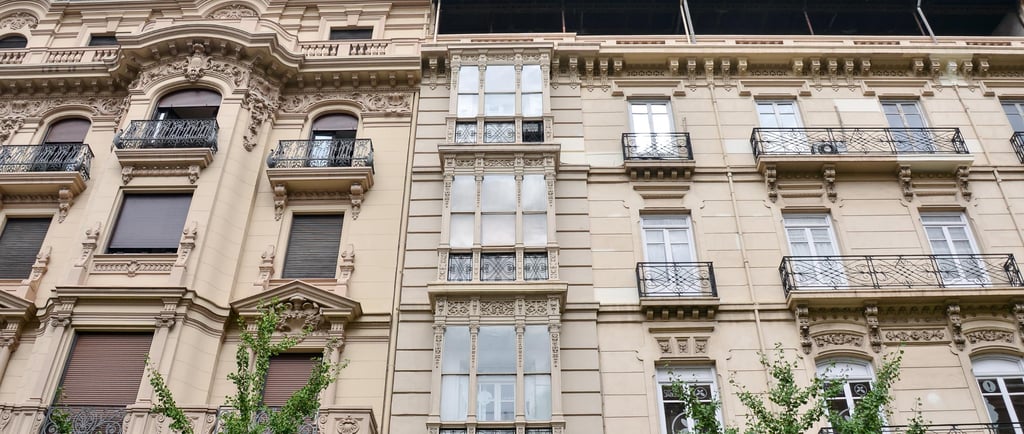Six Things You Should Know When Buying Real Estate in Argentina
Looking to buy real estate in Argentina? Learn everything foreign buyers need to know, from legal requirements and financing options to market trends and cultural considerations.
BUSINESSINVESTMENTSREAL ESTATE
4/4/20254 min read


Investing in real estate in Argentina can be an exciting and lucrative opportunity, but it's essential to understand the country's legal, financial, and cultural landscape before making a purchase. Whether you're considering buying a vacation home, rental property, or even relocating to Argentina, here are key points every foreigner should know before diving into the Argentine real estate market.
1. Legal Requirements for Foreign Buyers
Foreigners are allowed to buy real estate in Argentina without major restrictions. However, there are some key legal considerations to keep in mind:
Property Ownership: Foreigners can buy property in Argentina, but certain areas may have restrictions. Make sure to consult with a local lawyer or real estate agent to confirm if the property you are interested in is within these restricted areas.
Land Registration: Property ownership is officially recorded through the Argentine public registry. Once you purchase a property, the transaction must be registered to ensure legal protection of your ownership rights.
Title Search: It’s important to perform a title search before purchasing any property to confirm that the seller has legal ownership and that there are no encumbrances or debts associated with the property.
Notary Public (Escribano): All real estate transactions in Argentina must be notarized by an "Escribano" (notary public). This professional will ensure the contract is legal and compliant with Argentine laws.
2. Financing and Payment Options
Unlike many countries, financing for foreign buyers in Argentina can be tricky:
No Mortgage Financing for Foreigners: Argentine banks do not typically offer mortgage loans to foreigners, so most buyers must be prepared to pay in full upfront. It’s crucial to plan your finances accordingly, especially if you’re considering an investment that requires a large upfront cost.
Currency Considerations: Argentina’s economy has experienced significant fluctuations in the value of its currency, the Argentine Peso (ARS). As a result, many property transactions are conducted in US dollars (USD) rather than pesos. Be sure to stay informed about the current exchange rate and potential risks tied to currency fluctuations.
Notary Fees and Taxes: The cost of notarization and other transaction-related fees can be between 3-5% of the property value. Additionally, there are taxes such as the "Impuesto a la Transferencia de Inmuebles" (Property Transfer Tax) and other legal fees that buyers need to account for.
3. Property Taxes and Ongoing Costs
After purchasing a property, it’s important to understand the ongoing costs associated with ownership:
Property Tax (ABL): Similar to other countries, Argentina imposes property taxes on real estate. The amount you pay depends on the location and value of the property. In some cases, this can be a relatively small fee, but in prime areas such as Buenos Aires, it can be more substantial.
Homeowner’s Association Fees (Expensas): If you're purchasing a property in a condominium or apartment complex, you may be required to pay monthly homeowner’s association fees (expensas) for maintenance and communal services.
Utilities and Services: Be prepared to pay for basic utilities such as electricity, water, and gas. These costs can fluctuate based on consumption, but the prices tend to be relatively affordable in comparison to other countries.
4. Understanding the Market
The Argentine real estate market can be volatile and subject to fluctuations in the economy, inflation rates, and government policies. It’s important to understand the market trends before making a purchase.
Property Value Trends: Argentina has historically faced inflationary pressures, which can impact property values. However, in some areas, particularly in Buenos Aires and tourist destinations, property values have seen significant increases. Research local market conditions carefully and consider hiring a local real estate expert to guide you through this process.
Renting vs. Buying: Argentina's rental market can offer great returns for investors, especially in cities like Buenos Aires, Mendoza, and Cordoba, which attract both locals and tourists. If you're buying with the intention of renting out the property, make sure to research the rental laws, including tenant rights and rental yields.
Location: The location of your property will have a significant impact on its value and potential for appreciation. Buenos Aires, Patagonia, and popular wine regions such as Mendoza have robust real estate markets, while more remote areas may offer lower prices but could present challenges with access to amenities.
5. Cultural and Local Considerations
In addition to the legal and financial aspects, it’s essential to understand some cultural factors when purchasing real estate in Argentina:
Language Barrier: Spanish is the official language in Argentina, so having a basic understanding of the language, or working with a bilingual real estate agent, will be beneficial. Most legal documents and contracts will also be in Spanish.
Negotiating Culture: The Argentine negotiating style can be more formal and face-to-face. It’s common for both buyers and sellers to engage in extended negotiations. Understanding the local customs and building a relationship with the seller or agent can help facilitate smoother transactions.
Maintenance and Property Care: In Argentina, especially in large cities like Buenos Aires, it’s common for properties to require regular maintenance due to the climate, which can lead to issues like mold, water leaks, and rust. Be prepared for these potential challenges, and always budget for ongoing repairs.
6. Exit Strategy and Resale Value
If your goal is to eventually sell the property, it’s important to keep in mind the resale value. The Argentine real estate market can be unpredictable, and it’s not always easy to sell a property quickly, especially in more remote areas or smaller towns.
Market Liquidity: In larger cities like Buenos Aires, properties are easier to sell due to higher demand. In contrast, rural areas may not see as much demand, which could lead to a longer selling process.
Capital Gains Tax: When selling property in Argentina, you may be subject to a capital gains tax. The tax rate depends on how long you’ve owned the property and other factors, so be sure to consult with a tax professional.
Conclusion
Buying real estate in Argentina as a foreigner can be an exciting opportunity, but it requires careful planning and due diligence. By understanding the legal and financial landscape, staying informed about the local real estate market, and being aware of the cultural nuances, you can ensure that your investment is both secure and profitable. Whether you're looking for a vacation home, rental property, or a long-term investment, Argentina offers a wealth of opportunities for those who are prepared to navigate its complexities.
Do you need help with your real estate in Argentina? We’re here to help! Contact us with any questions — we’ll gladly provide the answers you need
Know Argentina
Discover diverse insights about Argentina's rich culture.
Connect
stay in the loop
info@knowargentina.com
© 2025. All rights reserved.
